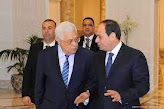“No recognition of, and no legitimacy to, the appointments announced by the Palestinian Central Council (PCC) during its illegitimate meeting on Sunday and Monday,” the groups said in a joint statement.
The 142-member PCC – a key decision-making body of the PLO – consists of various PLO factions, including the PFLP. Hamas and PIJ are not part of the PLO or any of its bodies.
During the session in Ramallah earlier, the council approved the appointment of Abbas associates Hussein al-Sheikh, Rouhi Fattouh, Mohammed Mustafa and Ramzi Khoury to fill vacancies in the PLO Executive Committee and its parliament in exile, the Palestinian National Council (PNC).
Abbas’s critics said that he convened the council to promote his loyalists, especially Sheikh, and consolidate his power over the Palestinian leadership.
Sheikh, 62, head of the Palestinian General Authority of Civil Affairs, is regarded as one of Abbas’s most trusted aides. Some Palestinians are convinced that the 86-year-old Abbas is grooming him as his successor.
Sheikh was elected to replace Saeb Erekat, who served as Secretary General of the PLO Executive Committee and chief Palestinian negotiator until his death in 2020.
Fattouh, another longtime Abbas associate, was chosen as speaker of the PNC, replacing Salim Zanoun, who retired after 30 years on the job.
Mustafa and Khoury, who are also closely associated with Abbas, were picked by the PCC members to serve as members of the PLO Executive Committee, the organization’s most important decision-making body.
The promotion of the Abbas loyalists is seen by some Palestinians as an attempt by the PA president to determine the identity of the future leaders of the Palestinians.
The appointments, in addition, send a message to the Palestinians, Israel and the US that their next leaders will continue with the same policies of Abbas.
The rare joint statement by Hamas, PIJ and the PFLP said that the appointments “do not represent our people, and constitute a breach of the national consensus and a suppression of the will of the Palestinian people.”
The groups called on the Palestinian leadership to immediately cancel the appointments and end its hegemony over Palestinian institutions. They further called for the establishment of a transitional PNC that would pave the way for holding general elections.
The parliamentary and presidential elections were supposed to take place in May and July. Abbas, however, called off the elections on the pretext that Israel had refused to allow them to take place in Jerusalem. Abbas’s political rivals have rejected the claim, saying he canceled the vote over fear that his fragmented and corruption-riddled Fatah faction would lose.
Hamas, PIJ and PFLP said in their statement that there will be no return to the Oslo track, referring to the 1993 accords signed between the PLO and Israel. The groups stressed that the only way to deal with Israel was through resistance, and called for the formation of a national unified command of the popular resistance to act against IDF soldiers and settlers.
The PCC issued a final communiqué on Wednesday night saying that it has decided to end security coordination between PA security forces and the IDF, and suspend Palestinian recognition of Israel. The statement, issued a day after the IDF killed three Fatah gunmen in Nablus, is seen as an attempt by the PA leadership to placate the Palestinian public.
A similar statement issued by the council in 2018 was completely ignored by the PA leadership.
The three men killed were responsible for a series of shooting attacks on soldiers and settlers in the Nablus area in the past few weeks. Their killing sparked widespread anger among many Palestinians, some of whom claimed that this was the direct result of the security coordination with Israel.
The slain gunmen belonged to Fatah’s al-Aqsa Martyrs Brigades. Some of their friends in Nablus accused the PA of helping Israel track them down, noting that two of them had been previously harassed and threatened by the Palestinian security forces in the West Bank.
The PCC decision to end security coordination and suspend Palestinian recognition of Israel has not been taken seriously by many Palestinians, including members of Abbas’s ruling Fatah faction.
“I thought I was reading the same statement that the council issued in 2018,” said a senior Fatah official in Ramallah. “Whoever issued the statement on Wednesday must think that the Palestinians are stupid. Everyone knows that decisions like these are just intended for international consumption and are never implemented.”
Hamas spokesperson Hazem Qassem played down the significance of the PCC statement, saying its decisions will remain ink on paper. The council meeting, he said, did not represent the aspirations of the Palestinians.







